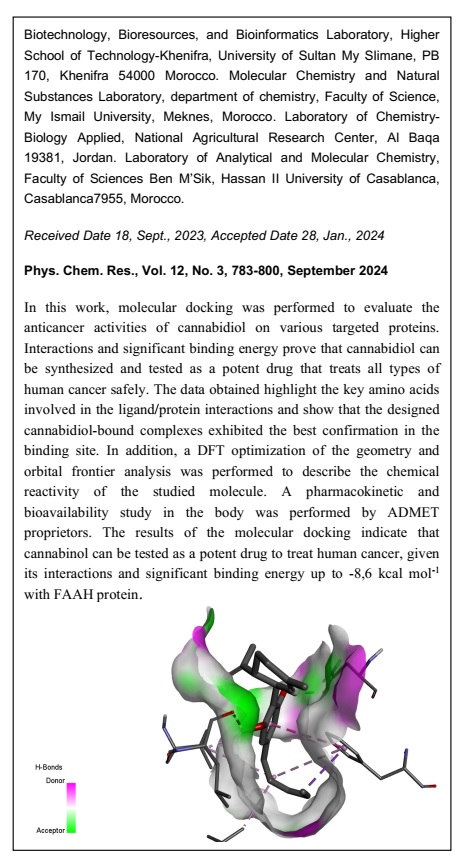Document Type : Regular Article
Authors
1
Biotechnology, Bioresources, and Bioinformatics Laboratory, Higher School of Technology-Khenifra, University of Sultan My Slimane, PB 170, Khenifra 54000 Morocco.
2
Molecular chemistry and Natural Substances Laboratory, Moulay Ismail University, School of Science, Meknes
3
Basic Science Department, Prince Al Hussein Bin Abdullah II Academy for Civil Protection, Al-Balqa Applied University, Al-Salt 19117, Jordan
4
Laboratory of Analytical and Molecular Chemistry, Faculty of Sciences Ben M’Sik, Hassan II University of Casablanca, Casablanca7955, Morocco
5
Molecular Chemistry and Natural Substances Laboratory, department of chemistry, Faculty of Science, My Ismail University, Meknes, Morocco
6
MCNS Laboratory, Faculty of Science, Moulay Ismail University, Meknes, Morocco
10.22036/pcr.2024.425179.2450
Abstract
In this work, molecular docking was performed to evaluate the anticancer activities of cannabidiol on various targeted proteins. Interactions and significant binding energy prove that cannabidiol can be synthesized and tested as a potent drug that treats all types of human cancer safely. The data obtained highlight the key amino acids involved in the ligand/protein interactions and show that the designed cannabidiol-bound complexes exhibited the best confirmation in the binding site. In addition, a DFT optimization of the geometry and orbital frontier analysis was performed to describe the chemical reactivity of the studied molecule. A pharmacokinetic and bioavailability study in the body was performed by ADMET proprietes. The results of the molecular docking indicate that cannabinol can tested as a potent drug to treat human cancer, given its interactions and significant binding energy up to -8,6 kcal/mol with FAAH protein.
Graphical Abstract

Keywords
Main Subjects

